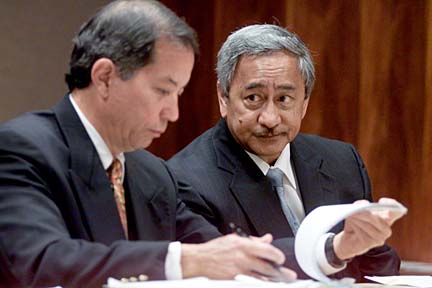
DENNIS ODA / DODA@STARBULLETIN.COM
Defense attorney Howard Luke, left, and retired Assistant Police Chief Rafael Fajardo conferred yesterday after the judge granted Fajardo's request to defer his no-contest plea.
Ex-cop avoids prison
in food scandalA state judge grants the
retired assistant police chief's
request to defer his plea
A retired assistant police chief will not serve any time in prison for theft despite his admission that he and other officers consumed food budgeted for prisoners.
"I should not have allowed food to be eaten by police officers," retired Assistant Chief Rafael Fajardo, 61, told the court yesterday.
Fajardo said he was unaware that subordinates were using order forms to purchase food for officers.
It was the first time Fajardo has responded publicly to the second-degree theft charge to which he pleaded no contest. Maj. Jeffrey Owens has also pleaded no contest to theft.
Both were in charge of the Central Receiving Division during overlapping periods between 1995 and 2000 and authorized purchases of food that was to be fed to prisoners.
Circuit Judge Karl Sakamoto granted Fajardo's request yesterday for a deferral of his no-contest plea, citing his contributions to the community in his nearly 37 years on the police force.
If Fajardo stays out of trouble for the next five years, he can seek to have the charge expunged from his record. He had faced a maximum five years in prison and a $10,000 fine.
Total loss to taxpayers was estimated at about $22,000, said Deputy Prosecutor Randal Lee.
The food items included eggs, sausage, bacon, steak, chicken, ham, turkey and roasts, Lee said. Steaks and, on one occasion, rack of lamb were also purchased.
Prisoners were usually fed peanut butter and jelly sandwiches for breakfast and frozen meals that were heated and supplemented with rice or vegetables for lunch and dinner, Lee said.
Lee had asked the judge to deny Fajardo a deferral and sentence him to probation. To grant Fajardo a deferral would undermine the public's confidence in the system and cast a cloud on honest police officers who were only following his orders, Lee said.
In letters to the court, officers recalled Fajardo's generosity at the Pearl City station during the 1980s when he would cater food for all the officers and would never ask for payment.
Defense attorney Howard Luke said many people were involved in what he called "irresponsible consumption of food," but were not prosecuted.
Fajardo would never have allowed food to be purchased for officers under the pretense that they were for prisoners and he never signed any of the purchase forms or asked that the forms be used to obtain food for officers, Luke said. He said Fajardo should not be held responsible for thefts that occurred that he knew nothing about.
Fajardo said it was his responsibility as commander of the Central Receiving Division to recognize problems and his failure to do so "allowed food to be illegally obtained, stolen and eaten."
He apologized to the taxpayers and to the Honolulu Police Department.
While Sakamoto acknowledged Fajardo's rise from impoverished roots to a leader who instilled in others high moral standards by example, he said Fajardo's desire to improve the morale of his officers "blinded and misguided" him in carrying out his duties and resulted in the erosion of standards that he had worked decades to build.
Sakamoto ordered Fajardo to make restitution of $4,534 and perform 100 hours of community service.
When asked by reporters outside the courtroom how he felt about the court's decision, Fajardo declined comment. His parting words to reporters were, "I'm hungry."
